18+ Sample Cover Letter for Internship
-
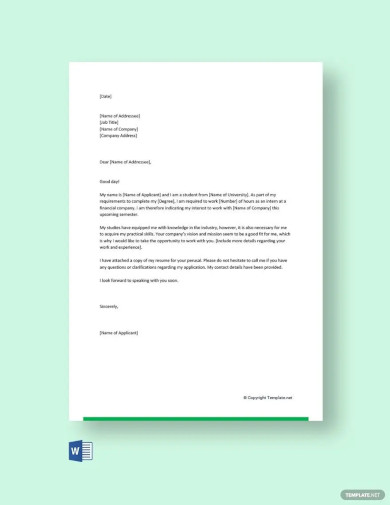
Cover Letter for Internship in Finance Template
download now -
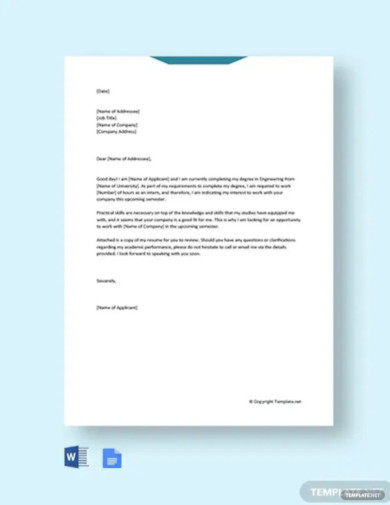
Cover Letter for Internship Engineering Template
download now -
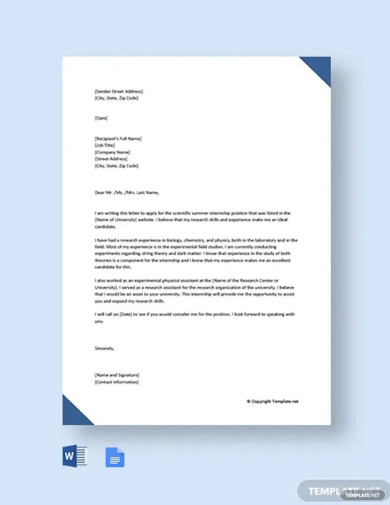
Cover Letter For Internship With No Experience Template
download now -
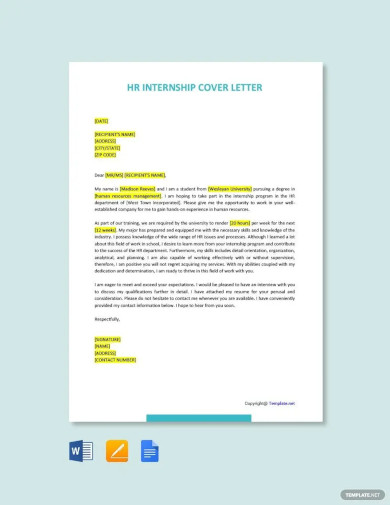
HR Internship Cover Letter
download now -
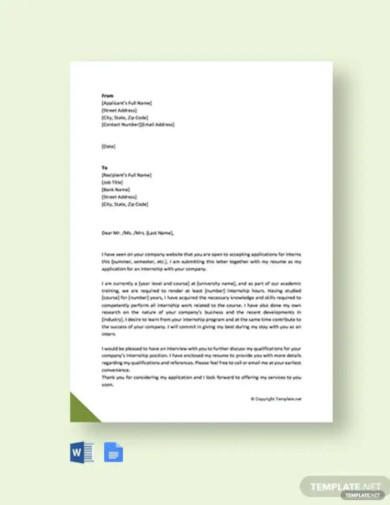
Cover Letter for Internship Template
download now -

Project Management Internship Cover Letter
download now -
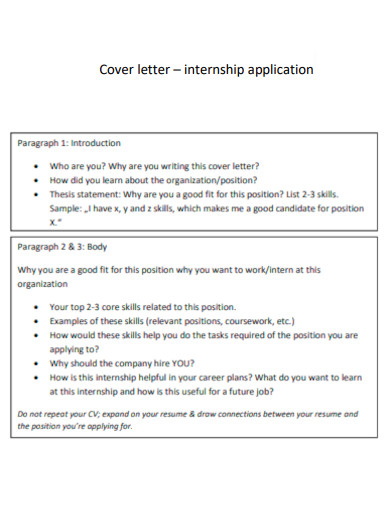
Internship Application Cover Letter
download now -
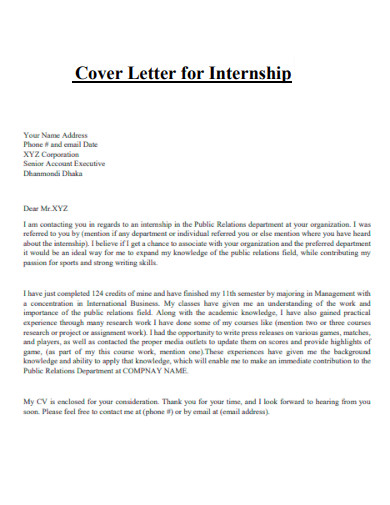
Simple Cover Letter for Internship
download now -
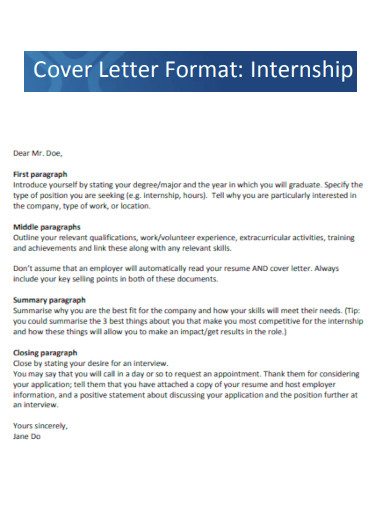
Internship Cover Letter Format
download now -

Cover Letter of Non-Profit Internship
download now -
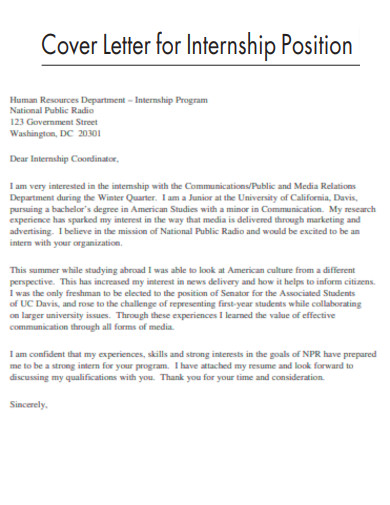
Cover Letter for Internship Position
download now -
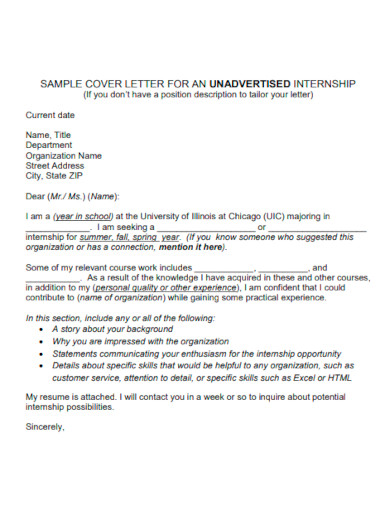
Cover Letter for Unadvertised Internship
download now -
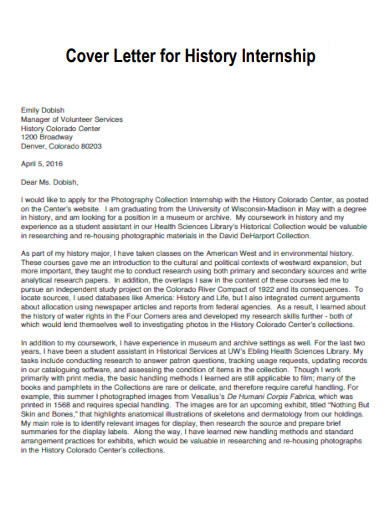
Cover Letter for History Internship
download now -
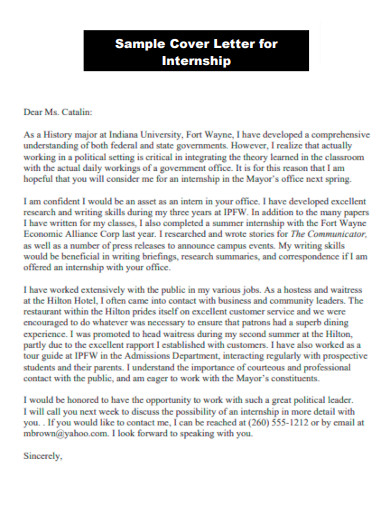
Sample Cover Letter for Internship
download now -
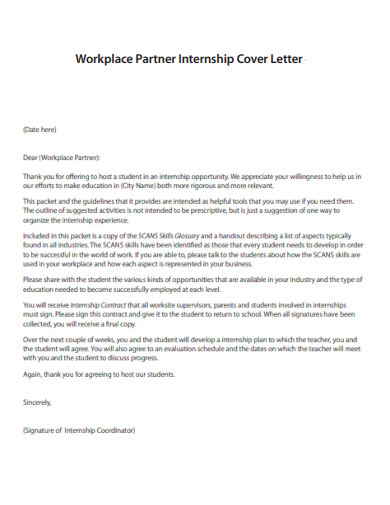
Workplace Partner Internship Cover Letter
download now -
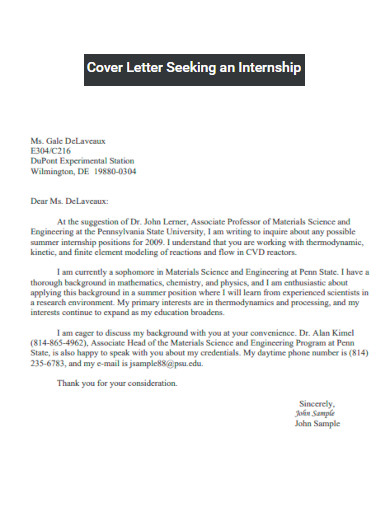
Cover Letter Seeking an Internship
download now -
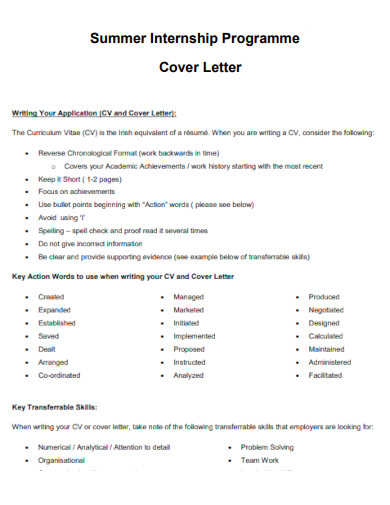
Summer Internship Programme Cover Letter
download now -
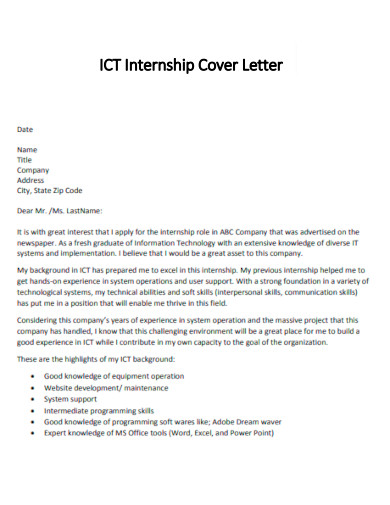
ICT Internship Cover Letter
download now -

Psychology Internship Program Cover Letter
download now
FREE Cover Letter for Internship s to Download
18+ Sample Cover Letter for Internship
What Is an Internship?
Benefits of Internships
Tips to Find an Internship
How to Write a Cover Letter for an Internship
FAQs
How long is a cover letter?
Should interns write a cover letter?
What to include in a cover letter for a research internship?
What Is an Internship?
An internship is a temporary job that is recruited for. They may be compensated or uncompensated because the intern’s primary goal is to gain experience. Typically, you apply for an internship while pursuing your undergraduate or graduate degree in your subject of interest. After accepting the position, you work full- or part-time for a company for one or more months. You can work as an intern during the summer or while taking coursework in a semester or quarter. You can get college credit for some internships. You can complete academic requirements, build your resume in PDF, and obtain valuable professional experience through internships. They can help you learn about all facets of a full-time job while letting you explore your hobbies and develop your career ambitions.
Benefits of Internships
Consider how an internship might help you focus and prepare for future jobs when you complete your undergraduate education and start down your chosen professional path. The following are a few benefits of internships for students:
Tips to Find an Internship
You have the best time finding the ideal internship if you employ multiple approaches. Networking, attending career fairs, searching for internship listings online, and identifying potential employers through classified ads or an online search are all excellent methods to begin your internship search. Finding an internship takes time and effort, but the results are worth the investment. Here are some suggestions for individuals pursuing an internship.
1. Start Looking For Internships Early
Specific industries and apprenticeships have early application deadlines; be aware of these. Some companies may begin recruiting and hiring for summer internships early in November. Starting your internship search during winter break will provide additional lead time before the summer. Before returning to school, you can establish valuable connections with alums or professionals within organizations of interest.
2. Consider a Variety of Career-Related Internships
Make a decision, but don’t worry about being overly particular. If you need clarification about the career you want to pursue, gaining experience in several different employment categories is an excellent idea. Assess your interests and how they might translate into a job. These can expose you to possibilities and allow you to explore brand-new, intriguing career paths.
3. Network With Everyone
Speak with family, friends, faculty, college advisors, and career counselors in your institution’s Career Services Office about the type and place of internship you want. Contacting alums from your college and conducting informational interviews can provide you with valuable insight regarding potential careers and internships. Be sure to mail them a note of gratitude for sharing their time and knowledge. If interested in internships at specific companies, communicate with former interns and current employees on LinkedIn. Send a note asking for advice before your application or if they’d be interested in a coffee date.
4. Use All the Online Resources
Your college’s Career Services Office will likely recommend internship resources you can use or subscribe to, but you should dig deeper online. Also, you can create a list of companies you venerate and visit their websites to determine if they have internship openings. If they don’t, try setting up a Google Alert that will email you whenever an internship is posted online; just be sure to use the appropriate keywords to receive relevant alerts.
5. Start Your Own Small Business To Gain Experience
Do you possess unique abilities or an action plan for meeting a market need? Launch a modest business to gain experience as a high school or college student. You could leverage this experience to obtain additional internships and employment applications. Your initiative and perseverance will undoubtedly impress future employers. This modest business could expand your professional network and introduce you to potential internship employers.
How to Write a Cover Letter for an Internship
Writing a cover letter can be intimidating, especially if you lack extensive professional experience. Fortunately, a cover letter allows you to describe how your extracurricular activities and coursework have equipped you with exceptional leadership development plans and time management skills. Personalizing your cover letter for each internship application you intend to submit will help you stand out. However, your cover letter differs from the place to repeat your resume. This is your opportunity to select a few accomplishments from the job description and provide examples of how you’ve demonstrated these skills.
1. Include Your Name, the Date, Your Location, and Your Contact Details
Although some companies are staunchly opposed to applicant tracking systems, many companies you apply to will likely use one to review your resume and cover letter. Thus, you must distinguish yourself from an automated system and human recruiters. Have you ever heard the misconception that writing your name on the SAT would earn you extra points? The same holds for including contact information in your cover letter. Make it simple for the recruiter to contact you by supplying a current phone number and email address.
2. Include the Company, Department, and Address of the Company
If you’re writing cover letters for multiple internships, you’ll find it helpful to research the company’s complete name, department, and headquarters address. This separate phase will assist you in accurately copying the information into your cover letter. Remember, you want to avoid any typos or grammatical errors in your cover letter, particularly when it comes to information that is readily available online. You may omit the department name if you are dubious of its accessibility.
3. Address the Prospective Employer
As a student applying for an internship, your resourcefulness will set you apart from other candidates. You can demonstrate resourcefulness by researching the recruiting manager’s name to address your cover letter appropriately. In some instances, their title is included in the role description. You can then search LinkedIn for the position to identify the individual. If you cannot locate a person’s name, you may address them solely by their title.
4. Sell Your Experience
Scan the internship position description and select a few of the descriptors you believe apply to you; however, avoid setting all of them, as doing so could make your cover letter appear insincere and lengthy. Mentioning the characteristics explicitly in your cover letter demonstrates that you have read the job description and makes your cover letter easier to scan. If the hiring manager explores a candidate with content skills, she may check your cover letter for words that indicate content-related experience.
5. End the Letter With Courtesy and a Call to Action
You can have a call to act for the recruiting manager. Possess a link to your online portfolio sample, website, or YouTube channel showcasing your work and demeanor. Include tracking to your link using a URL tracker to collect data on the frequency with which recruiting managers view these additional items.
FAQs
How long is a cover letter?
A cover letter can range from half a page to an entire page. Generally, you should strive for 250 to 400 words and three to six paragraphs in your cover letter.
Should interns write a cover letter?
First things first: if you’re pondering if you need a cover letter to apply for an internship, the answer is yes.
What to include in a cover letter for a research internship?
Your cover letter should emphasize relevant skills development plan, accomplishments, and interests for your internship and present them in a way that enhances rather than duplicates your CV. It should also demonstrate your familiarity with the organization you are applying to.
Only sometimes is a resume sufficient to make an impression. The first step in distinguishing yourself from other applicants is to include a cover letter with your internship letter of application. Study and implement the measures for writing a professional cover letter for an internship, and use one of these samples or templates to personalize your letter.
